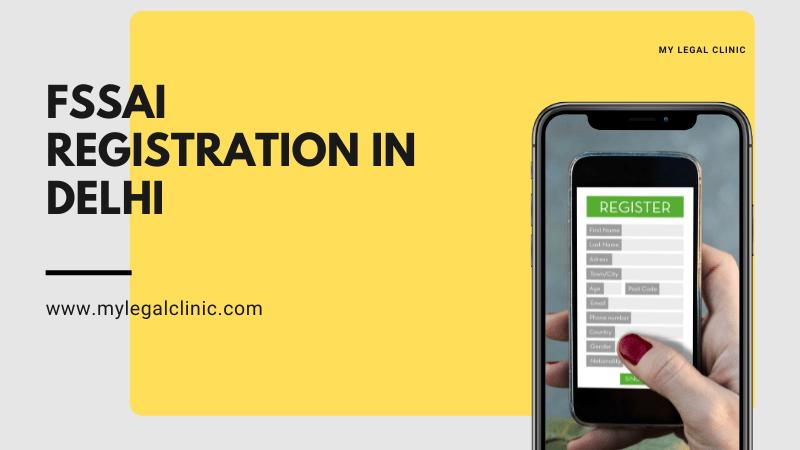The FSSAI, a regulatory authority, ensures that every food produced, exchanged, or traded in India is safe to ingest. The FSSAI requires all food-related firms to either register with them or obtain their licenses to fulfill its mission. FSSAI registration in Delhi governs food production, storage, distribution, marketing, and import. As a result, all Food Business Operators (FBOs) must obtain an FSSAI license.
FSSAI food licensing is crucial to your catering business. The registration rules are rather complex, and the registration process must be completed with considerable care. To know the FSSAI registration process in Delhi, continue reading.
Types of Food Registration
FBOs involved in only one or all steps of food goods such as production, trading, labeling, wholesaling, re-packing, re-labeling, importing, exporting, supplying, packing, and transporting must apply for FSSAI Licence and Registration.
Your company's need for an FSSAI License or FSSAI Registration is determined by a few parameters, such as annual turnover, installed capacity, area of operations, whether it is limited to one state or has branches, and so on. Along with this, the sort of registration you are looking for is one of the most crucial variables. There are 3 types of FSSAI Registration in India.
- State Food License: The primary criterion for applying for a State Food License is that your business's yearly turnover is between Rs. 12 lakh and a maximum of Rs. 20 crores. You must apply to the state government in which your firm is located for an FSSAI State License.
- Basic FSSAI Registration: FBOs with annual revenue of up to Rs. 12 lakh are required to register for a Basic Food Registration. These include all small-scale operators who operate within a single area, region, city, or town and are registered with FSSAI as a Basic FBO. This type of Basic certificate must be sought in the state where the business is established.
- Central Food License: A Central FSSAI Registration is required if the annual turnover exceeds Rs. 20 crores. FBOs with many locations of restaurants or food outlets must apply for a Central Food License. Aside from that, there are a few other requirements to be met, such as 100 percent export-oriented units, importers, and operators affiliated with the Central Government, who must apply for a single Central License and a separate license for each branch based on the eligibility standards that apply to them.
Eligibility for Obtaining License and Registration
It must be registered with FSSAI as a Basic FBO. This type of Basic certificate must be sought in the state where the firm is starting. The eligibility conditions for each sort of registration are listed below. To make it possible for FBOs to choose and apply for the appropriate certificate.
State Food License
The following regulations govern this license:
- FBO (supplier, distributor, food vending establishments, wholesaler, retailer, or Dhaba, club, canteen, restaurants) with an annual turnover of Rs. 12 lakhs to up to Rs. Twenty crores, Proprietary Foods, Production, and processing units of vegetable oil by solvent extraction and refineries including oil expeller unit Hotels with yearly revenue of Rs. 12 lacs to Rs. 20 crores, Hotels with a 4-star rating or less.
- Storages with a capacity of less than 50,000 metric tonnes per year, Dairy Machines (including chilling milk units) with a daily capacity to handle or process 500 to 50000 liters.
- A daily killing capacity of more than two and up to fifty huge animals. Or the ability to handle more than ten and up to 150 small animals. Or a daily capacity of more than 50 to up to 1000 chicken birds; or all food processing units other than those indicated above, including re-packers, with a daily capacity of not less than 100 kg/liter to up to 2 metric tonnes.
Basic FSSAI Registration
The following are the eligibility conditions for the Basic Certificate:
- FBO (restaurants, retailers, distributors, and suppliers) earns more than Rs. 20 crores
- Processing & Manufacturing units of vegetable oil by solvent extraction and refineries, including oil expeller units, with a capacity of more than 2 metric tonnes per day, club, food vending companies with branches in more than 1 state, Dhaba, canteen with an annual turnover of more than Rs. 12 lakhs
- Wholesalers with an annual turnover of at least Rs. 30 crores
- Hotels with five-star ratings or higher, 100 percent export-oriented units involved in food production or processing
- All Importers (including the import of food ingredients or additives),
- Caterers employed by the Central Government or allied entities like railways, airlines, airports, seaports, defense, etc.
- Storages with a capacity of more than 50,000 metric tonnes,
- Dairy units (including chilling machines) capable of handling or processing more than 50,000 liters per day
- A slaughtering capability of more than 50 large animals, more than 150 small animals, or more than 1000 poultry birds each day.
- All food processing units other than those indicated above, including re-packers (excluding grain, pulse, and cereal milling units), with a capacity of more than 2 metric tonnes per day
- All FBOs involved in the manufacturing of food, additive, or ingredient that uses a new technique or technology, or a combination of techniques and technologies, whose safety has not yet been proved by the FSSAI, are exempt from this requirement. On the other hand, they may not have a proven track record of safe use. In this case, it applies to food goods that are being imported for the first time into the country.
Food License Registration Forms
The FSSAI required reports for Food License vary depending on the type of registration you seek, such as Simple Registration Form A or Food License Form B. Whether you need a Form, A, or Form B is determined by the FBO's turnover.
- Form A of the FSSAI Registration: When the small FBO has yearly sales of less than 12 lakhs, the basic FSSAI Registration Form A must be documented.
- FSSAI Registration Form B: For food units with turnover less than 20 crores and whose zone of operation is limited to the state as it currently exists, or for food units with sales larger than 20 crores, Form B must be filed with the government.
- Form C for FSSAI Registration: The Licensing Authority must grant a License on Form C, a true copy of which must be displayed in a prominent location within the premises where the FBO always conducts its food business.
Food License Registration Procedure
The business volume and location mostly determine the FSSAI registration or license. It is determined by the applicant premises' capacity or turnover whether they are eligible for a license such as a central license, state license, registration, railways, etc. The FSSAI registration procedure is as follows:
- Step 1: Fill up Form A (application) to the food and safety department.
- Step 2: Within 7 days after the application date, the department may accept or reject the application.
- Step 3: If the application is accepted, the department will issue a registration certificate, along with the applicant's registration number and photo.
- Step 4: During business hours, FBO should prominently display the registration certificate at their location.
Common Documents Required for Obtaining Food License Registration:
- List of food products which would be dealt with
- Completed and signed form B
- Plan of Food safety management system.
- Proof of possession of premises such as Rental Agreement
- FBO photo identity
- Certificate of Incorporation/ Partnership deed/AoA etc.
My Legal Clinic is a firm that offers low-cost, high-quality services in corporate law and business accounting. Legality and accounting are essential in business, and we are professionals in both. Our staff includes CAs, Legal Experts, and CSs who have vast experience handling every aspect of the modern company in India.
From your initial business registrations to your compliance requirements, we've got you covered. In terms of an FSSAI license consultant in Delhi, our staff can manage it all while staying within your budget and time frame. Our goal is to provide a service that is affordable to most business owners.

